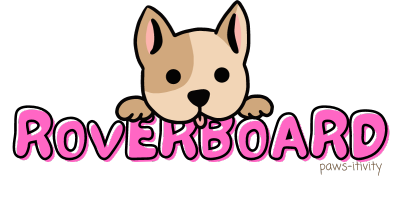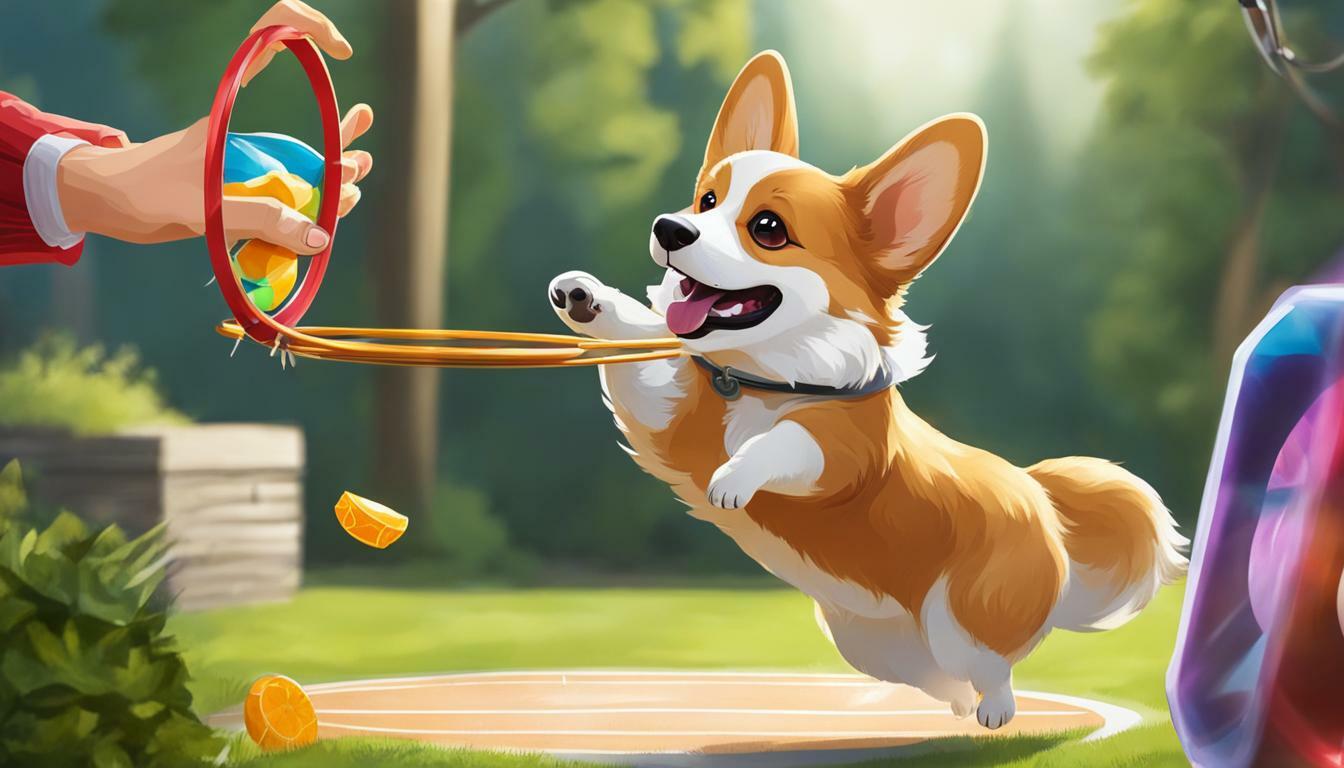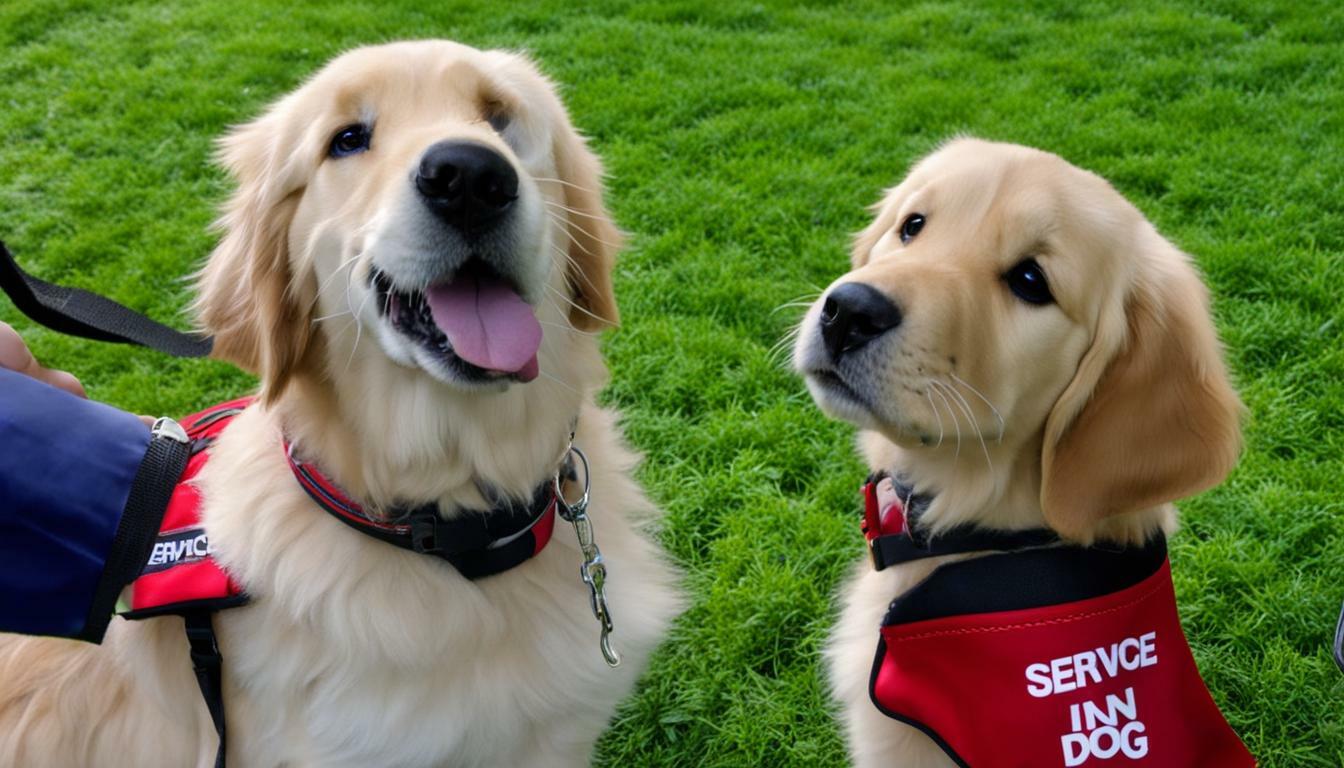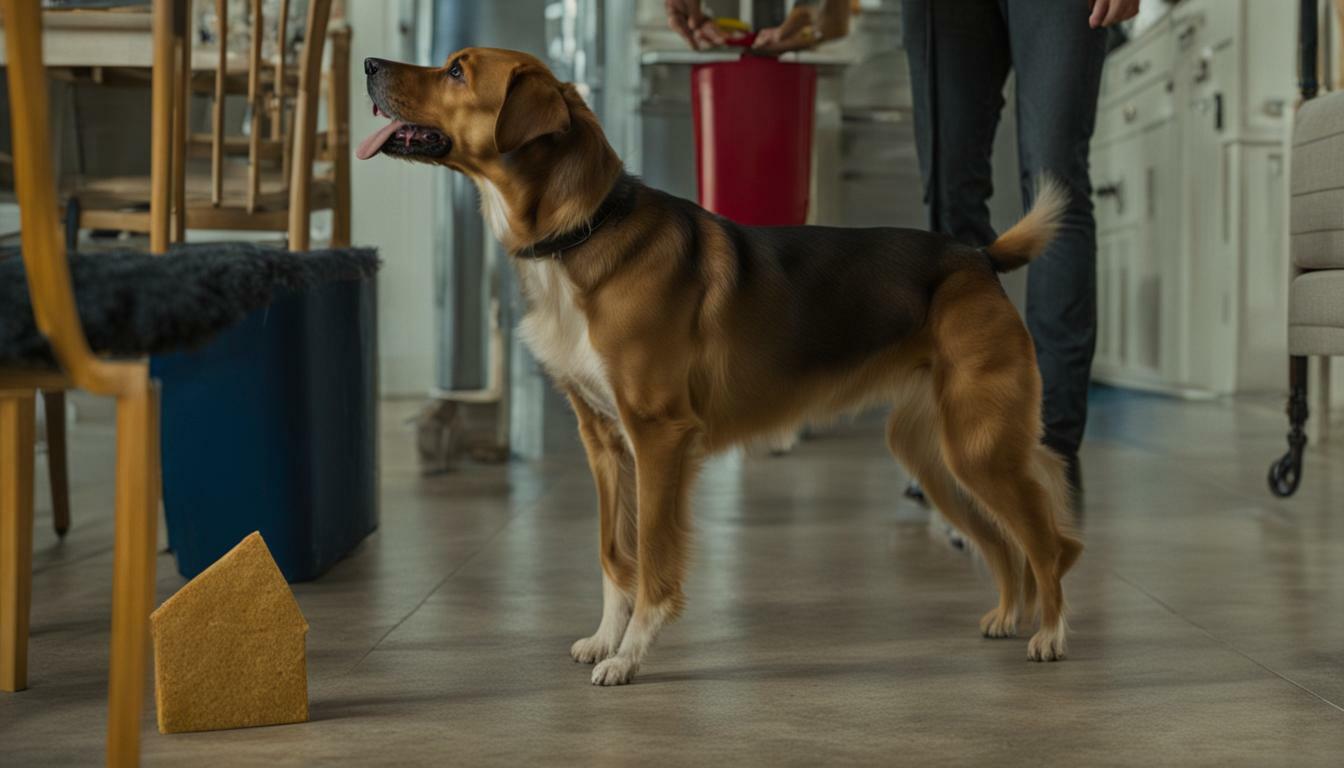>Pembroke Welsh Corgi Training Guide: Tips for Happy Dogs>
Training a Pembroke Welsh Corgi is essential for their safety, health, and overall well-being. These intelligent and attentive dogs thrive when given the opportunity to learn and follow commands. Training not only fosters a strong bond between Corgis and their owners, but it also keeps them mentally stimulated and physically active.
By starting training at an early age, typically between 8-16 weeks, Corgis can develop good behavioral habits and learn important socialization skills. Teaching them basic commands like sit, stand, and come, as well as house and potty training, are crucial for their development.
As they grow, Corgis should be introduced to grooming and handling, ensuring that they are comfortable being touched and groomed. Leash training and proper walking etiquette are also important to teach them, ensuring enjoyable walks and outings together.
Mental and physical stimulation is necessary for the overall well-being of Corgis. Engaging them in activities such as playing fetch, puzzle toys, and obedience training exercises can keep them mentally alert and prevent problem behaviors.
Once they have mastered basic obedience, Corgis can progress to advanced training and activities that suit their interests and abilities. This can include dog sports, agility training, and even therapy work.
Consistency and positive reinforcement are key in training a Pembroke Welsh Corgi. By rewarding desired behaviors and patiently repeating commands, owners can create a happy and well-behaved companion.
Key Takeaways:
- Training a Pembroke Welsh Corgi is important for their safety, health, and overall well-being.
- Starting training at an early age and socializing them with other dogs and people is crucial.
- Teaching basic commands, house and potty training, and leash etiquette are important aspects of Corgi training.
- Mental and physical stimulation through engaging activities is necessary for their well-being.
- Consistency and positive reinforcement are essential in training a happy and well-behaved Corgi.
Why Training a Pembroke Welsh Corgi is Important
Training a Pembroke Welsh Corgi is crucial as it offers numerous benefits for both the dog and the owner. Corgis are intelligent and attentive, making them highly trainable and eager to please. By providing consistent training, you can establish clear communication with your Corgi, resulting in better behavior and a stronger bond.
One of the key advantages of training a Pembroke Welsh Corgi is the ability to ensure their safety in various situations. Through obedience training, you can teach your Corgi essential commands like sit, stay, and come, which can prevent them from running into dangerous situations or engaging in unwanted behaviors. Additionally, training helps your Corgi to socialize with other animals and people, reducing the risk of aggression or fear-based reactions.
Training also enables you to have more enjoyable walks and outings with your Corgi. By teaching them leash etiquette and proper behavior in public, you can ensure their safety and the comfort of those around you. Furthermore, training provides mental and physical stimulation for your Corgi, keeping their minds sharp and bodies active, which is important for their overall well-being.
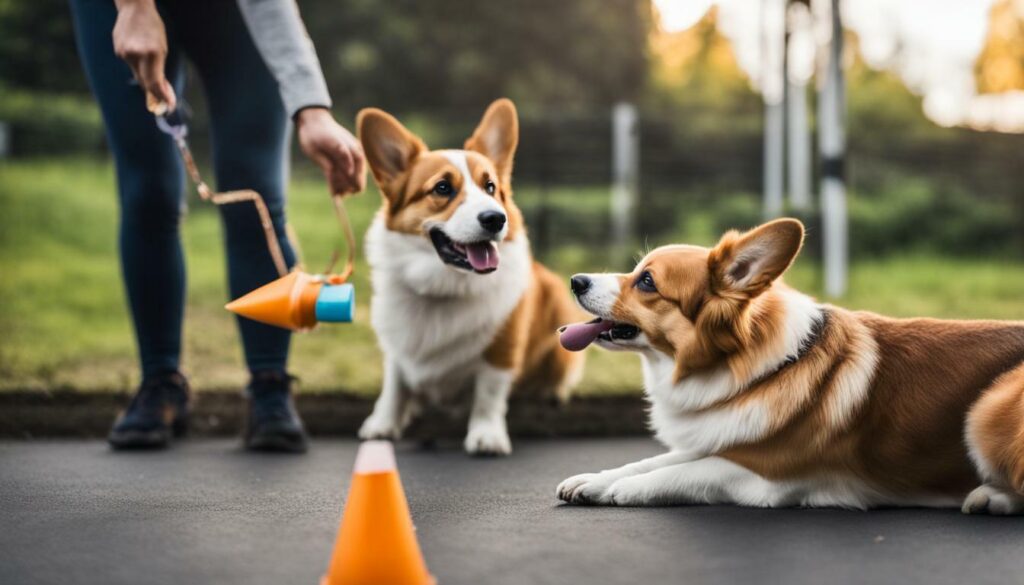
Benefits of Training a Pembroke Welsh Corgi:
- Improved communication and understanding between you and your Corgi
- Easier and safer interactions with other animals and people
- Enhanced obedience for better control in various situations
- Mental and physical stimulation to keep your Corgi happy and healthy
- Reduced potential for problem behaviors
It’s important to start training your Pembroke Welsh Corgi at an early age, ideally between 8-16 weeks old. This is when they are most receptive to learning and can begin to develop good habits and behaviors. Early training should focus on socializing your Corgi with other dogs and people, introducing them to different environments, and getting them used to grooming and handling.
Remember, training a Pembroke Welsh Corgi requires patience, consistency, and positive reinforcement. Rewarding good behavior with treats, praise, and playtime will motivate your Corgi and make the training experience enjoyable for both of you. With time and effort, you can have a well-behaved, happy, and healthy Corgi that brings joy to your life.
Starting Training at the Right Age
It is recommended to start training your Pembroke Welsh Corgi puppy between 8-16 weeks of age. This is the period when they are most receptive to learning and can easily adapt to new experiences and routines. Training at this young age sets the foundation for a well-behaved and obedient adult Corgi.
During this critical period, it is important to focus on socialization and basic commands. Introduce your puppy to different environments, people, and other animals to help them become confident and friendly. Positive interactions and rewards will create positive associations and encourage desired behaviors.
Teaching basic commands such as sit, stay, come, and lie down should also be a priority. These commands establish your position as the leader and help to reduce any potential problem behaviors. Using treats as rewards and positive reinforcement will make the training sessions enjoyable for your Corgi.

Table: Basic Commands and Training Tips
| Command | Description | Training Tips |
|---|---|---|
| Sit | Teaches your Corgi to sit on command. | Hold a treat above their head and slowly move it towards their tail. As they follow the treat with their eyes, their bottom will naturally lower into a sitting position. Once they are seated, give them the treat and praise. |
| Stay | Teaches your Corgi to stay in one place until released. | Start by having your Corgi sit. Extend your hand with the palm out and say “stay” in a firm but calm voice. Take a step back and wait a few seconds before returning to them and rewarding with a treat and praise. Gradually increase the distance and duration of the stay. |
| Come | Teaches your Corgi to come to you when called. | Squat down, open your arms, and use an excited tone to call your Corgi’s name followed by “come.” Encourage them with a treat or favorite toy. When they come to you, reward them and provide praise. Repeat this command in different locations and gradually reduce the use of treats. |
| Lie Down | Teaches your Corgi to lie down on command. | Start with your Corgi in a sitting position. Hold a treat near their nose and slowly lower it to the ground between their front paws. As they follow the treat, their body will naturally lower into a lying position. Once they are lying down, provide the treat and praise. |
Remember, training should be a positive and enjoyable experience for both you and your Corgi. Be patient, consistent, and always reward good behavior. With proper training, your Pembroke Welsh Corgi will grow into a well-mannered and happy companion.
Basic Commands and Socialization
Teaching your Pembroke Welsh Corgi basic commands and socializing them with other dogs and people are essential aspects of their training. Corgis are intelligent and eager to please, making them quick learners. By providing them with consistent training and positive reinforcement, you can ensure that your Corgi becomes a well-behaved and obedient companion.
When it comes to basic commands, start with the essentials such as sit, stay, come, and lie down. These commands will not only make your life easier but also keep your Corgi safe in various situations. Use treats and praise to reward your Corgi for following these commands, and practice them in different environments to reinforce their obedience.
Socialization is equally important for a Pembroke Welsh Corgi. Introduce your puppy to different people, animals, and environments from an early age. This will help them develop confidence and adaptability, ensuring that they interact positively with others. Take your Corgi on regular walks, visits to the park, and enroll them in puppy training classes to provide ample opportunities for socialization.
Socialization Checklist
- Expose your Corgi to different sounds, sights, and smells.
- Introduce them to children, adults, and other dogs.
- Encourage positive and controlled interactions.
- Monitor their behavior and intervene if necessary.
- Gradually expose them to new environments and experiences.
Remember, training a Pembroke Welsh Corgi requires patience and consistency. Keep training sessions short and enjoyable, and always end on a positive note. By investing time and effort into their training, you’ll have a well-behaved and happy Corgi that brings joy to your life.
| Command | Description |
|---|---|
| Sit | Teaches your Corgi to sit on command, useful for greeting guests and preventing jumping. |
| Stay | Teaches your Corgi to stay in one place until given permission to move, ensuring their safety in various situations. |
| Come | Teaches your Corgi to come to you when called, important for recall and off-leash training. |
| Lie Down | Teaches your Corgi to lie down on command, useful for calming them down and preventing unwanted behavior. |
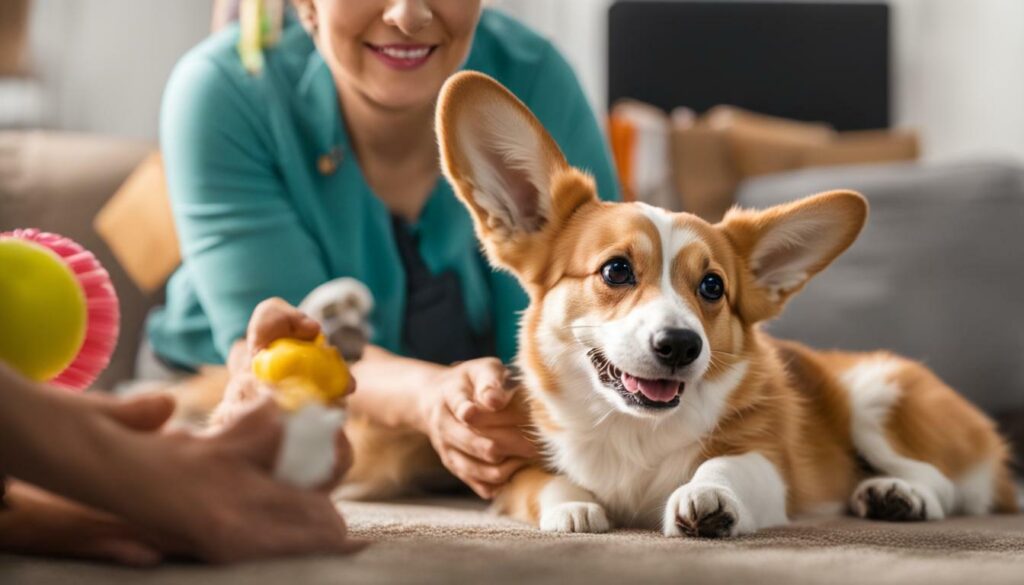
Properly potty training and house training your Pembroke Welsh Corgi is crucial for a well-behaved and clean household. Corgis are intelligent dogs and, with consistency and positive reinforcement, they can quickly learn where and when to do their business.
Start by establishing a designated potty area outside. Take your Corgi to this spot after meals, playtime, and naps, as well as first thing in the morning and before bed. Use a command, such as “go potty” or “do your business,” to associate the act with the command. Reward your Corgi with praise and treats when they successfully potty outside.
Inside the house, create a confined space for your Corgi when you cannot directly supervise them. This can be a crate or a small section of a room. Take your Corgi to their designated potty area immediately after confinement. Use a consistent command and give them plenty of time to potty. If accidents happen, do not punish your Corgi. Instead, clean it up without scolding them.
| Do’s | Don’ts |
|---|---|
|
|
Remember, potty training takes time and patience. Consistency is key, and eventually, your Corgi will understand where they should go to relieve themselves. With proper potty training and house training, you can enjoy a clean and well-behaved household with your Pembroke Welsh Corgi.

Leash training and teaching your Pembroke Welsh Corgi walking etiquette are essential for enjoyable and safe walks. Corgis are known for their lively and spirited nature, so proper leash training is crucial to ensure they stay by your side and follow commands.
Start by introducing your Corgi to the leash in a positive and controlled environment. Allow them to sniff and investigate it, rewarding them with treats and praise. Gradually attach the leash to their collar or harness, keeping the initial sessions short and relaxed.
During walks, maintain a relaxed grip on the leash, allowing some freedom but keeping your Corgi close to you. Use verbal cues and gentle tugs to guide their movements and reinforce commands such as “heel” or “stay”. Avoid pulling or yanking on the leash, as this can cause discomfort and anxiety for your Corgi.
Additionally, teaching proper walking etiquette, such as not pulling on the leash or jumping on people, is important for a well-behaved Corgi. Use positive reinforcement techniques, rewarding good behavior with treats or verbal praise.
| Leash Training Tips: |
|---|
| 1. Start leash training early. |
| 2. Use positive reinforcement. |
| 3. Keep training sessions short and enjoyable. |
| 4. Be patient and consistent. |
Common Mistakes to Avoid:
- 1. Pulling on the leash.
- 2. Using harsh corrections.
- 3. Allowing your Corgi to lead the walk.
- 4. Skipping training sessions.
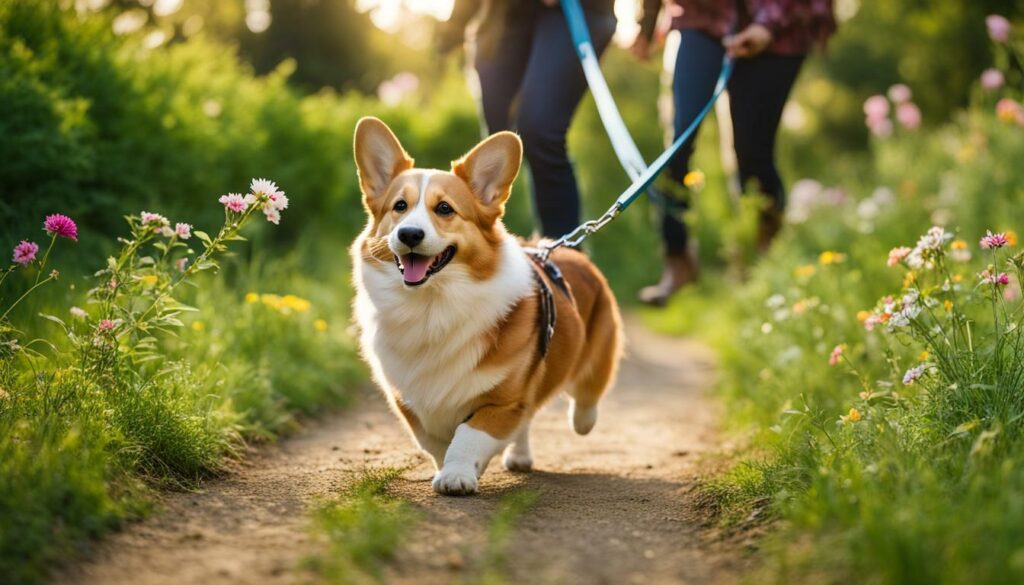
Remember, consistency and positive reinforcement are key in leash training and teaching walking etiquette to your Pembroke Welsh Corgi. With patience, practice, and love, you can enjoy many safe and enjoyable walks together.
Grooming and Handling
Introducing your Pembroke Welsh Corgi to grooming and handling is necessary for their overall well-being and comfort. Regular grooming sessions not only keep your Corgi looking neat and tidy, but they also help maintain healthy skin and coat. Start by gently brushing their fur using a slicker brush or a comb with wide teeth. This not only removes loose hair and prevents matting, but it also stimulates blood circulation and promotes a shiny coat.
Additionally, pay attention to their nails and ears. Trim their nails regularly, being careful not to cut too close to the quick. If you’re unsure, consult a professional groomer or veterinarian for guidance. Clean their ears on a weekly basis, using a gentle ear cleaner and cotton balls. This helps prevent infections and keeps their ears clean and odor-free.
While grooming, it’s essential to handle your Corgi with care. Get them used to being touched and examined by gently massaging their paws, opening their mouth, and inspecting their teeth. This will make future vet visits and routine check-ups less stressful for both you and your Corgi. Remember to always reward your Corgi with praise and treats during grooming sessions to create a positive association.
| Grooming Tips: | Handling Tips: |
|---|---|
| Brush their fur regularly | Massage their paws and touch their ears |
| Trim their nails carefully | Inspect their teeth and mouth |
| Clean their ears weekly | Be gentle and patient |
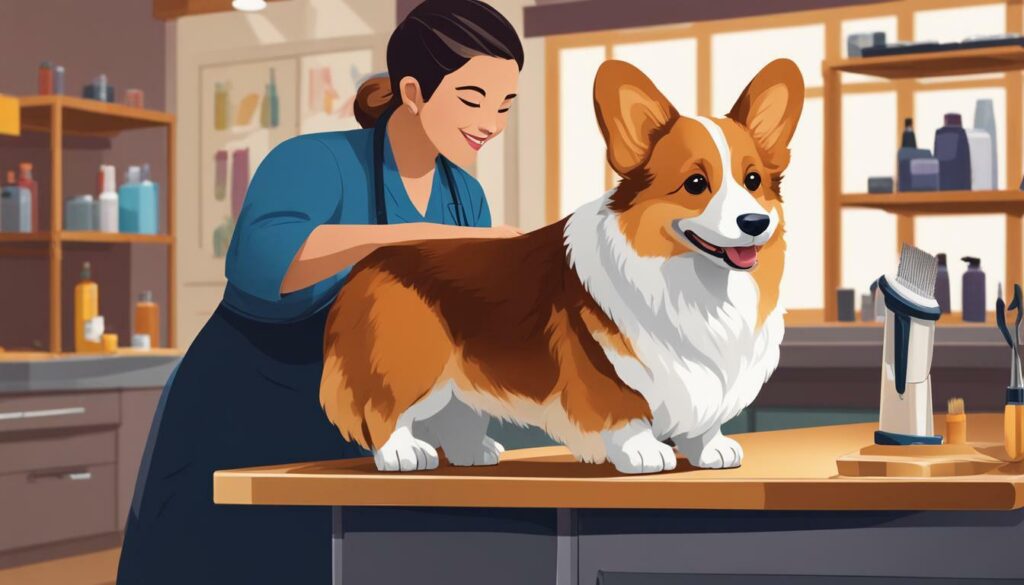
- Do use proper grooming tools and products suitable for Corgis.
- Don’t rush or force your Corgi during grooming sessions.
- Do reward your Corgi with treats and praise for good behavior.
- Don’t forget to check for any signs of skin issues or parasites.
- Do consult a professional groomer for more complex grooming needs.
By establishing a regular grooming routine and gentling handling your Corgi from a young age, you’ll not only help keep them clean and healthy but also strengthen the bond between you and your furry companion.
Mental and Physical Stimulation
Providing your Pembroke Welsh Corgi with adequate mental and physical stimulation is vital for their overall health and happiness. Corgis are active and intelligent dogs that thrive on mental challenges and physical exercise. Without these outlets, they can become bored, which may lead to destructive behaviors or excessive barking. To keep your Corgi engaged and content, incorporate various training techniques and activities into their daily routine.
Training Techniques
Corgis are known for their intelligence and eagerness to learn, making them highly trainable. Take advantage of their natural abilities by teaching them new commands and tricks. Use positive reinforcement, such as treats and praise, to reward good behavior. Consistency is key in training, so make sure to set aside regular training sessions and practice patience as your Corgi progresses.
Activities for Mental Stimulation
Corgis have an innate herding instinct, so activities that simulate this behavior can provide mental stimulation. Set up obstacle courses or agility courses in your backyard for them to navigate. Puzzle toys and interactive feeders can also challenge their problem-solving skills. Incorporate scent games, such as hiding treats around the house for them to find, to enhance their sense of smell.
Activities for Physical Stimulation
Corgis are energetic dogs that require regular physical exercise. Take them on daily walks or runs to keep them physically fit. Consider engaging them in activities like fetch or frisbee to satisfy their need for play and exercise. Swimming can also be a great low-impact workout for Corgis, as they are natural swimmers. Remember to adjust the intensity and duration of the activities based on your Corgi’s age, health, and fitness level.
| Training Techniques | Activities for Mental Stimulation | Activities for Physical Stimulation |
|---|---|---|
| Use positive reinforcement | Set up obstacle courses | Take them on daily walks |
| Be consistent and patient | Puzzle toys and interactive feeders | Engage in activities like fetch |
| Teach new commands and tricks | Incorporate scent games | Try swimming |
By providing your Pembroke Welsh Corgi with both mental and physical stimulation, you can ensure they lead a happy and fulfilled life. Incorporate training techniques, activities for mental stimulation, and activities for physical stimulation into their routine to keep them engaged and content.
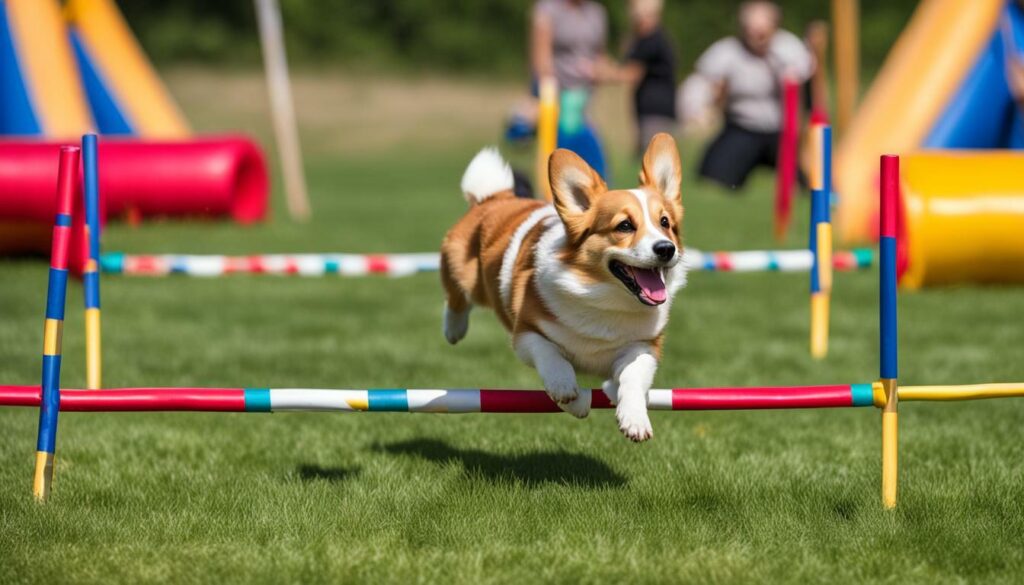
Once your Pembroke Welsh Corgi has mastered basic obedience, you can move on to advanced training and engaging activities. These activities will not only challenge your Corgi’s mind but also provide them with physical exercise and mental stimulation. Remember, a tired Corgi is a happy Corgi!
1. Agility Training
Agility training is a great way to keep your Corgi active and mentally sharp. Set up an agility course in your backyard using tunnels, jumps, A-frames, and weave poles. Start with simple obstacles and gradually increase the difficulty level as your Corgi progresses. This activity not only improves their physical fitness but also enhances their coordination and problem-solving abilities.
2. Trick Training
Corgis are intelligent and eager to please, making them perfect candidates for learning tricks. Teach your Corgi fun and impressive tricks like rolling over, playing dead, or even dancing. Trick training strengthens the bond between you and your furry friend while keeping them mentally engaged. Break down the tricks into small steps and use positive reinforcement to reward their efforts.
3. Nose Work
Corgis have a keen sense of smell, and nose work activities tap into their natural instincts. Hide treats or toys around the house or in your backyard and encourage your Corgi to use their nose to find them. You can also enroll them in scent detection classes to develop their scent discrimination skills. Nose work is not only mentally stimulating but also provides a great outlet for their energy.
| Benefits of Advanced Training and Activities |
|---|
| 1. Keeps your Corgi mentally stimulated and prevents boredom. |
| 2. Provides additional physical exercise for a healthy and fit Corgi. |
| 3. Strengthens the bond between you and your Corgi through positive reinforcement. |
| 4. Enhances problem-solving abilities and improves coordination. |
| 5. offers a fun and challenging outlet for their natural instincts and energy. |
Remember, training is an ongoing process, and it is important to keep your Corgi engaged and motivated. Vary the activities, use rewards, and always maintain a positive and patient approach. By continuing to train and engage your Pembroke Welsh Corgi, you will have a happy and well-rounded companion.
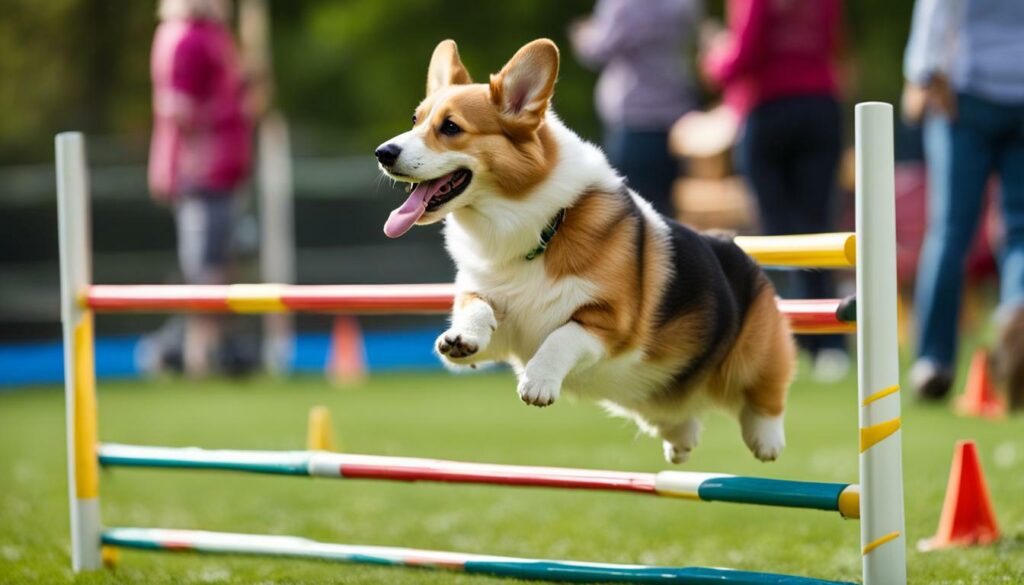
Consistency and positive reinforcement are key elements in effectively training your Pembroke Welsh Corgi. These two concepts go hand in hand to create a strong foundation for your training sessions. Consistency means setting clear expectations for your dog and sticking to them. This includes using the same commands, gestures, and cues consistently, as well as enforcing rules consistently.
Positive reinforcement involves rewarding your Corgi for good behavior with treats, praise, or play. This positive feedback encourages your dog to repeat the desired behavior. It is important to remember that training should always be a positive experience for your Corgi, as they respond best to encouragement and rewards rather than punishment or harsh methods.
One effective way to reinforce positive behavior is through the use of treats. Using small, soft, and highly desirable treats will motivate your Corgi to work and learn. Start by rewarding your dog for small achievements, gradually increasing the difficulty of the tasks as they progress. By providing consistent positive reinforcement, you are creating a positive association with the training process and building a stronger bond with your furry friend.

| Tip | Description |
|---|---|
| Start early | Begin training your Corgi when they are between 8-16 weeks old to establish good habits. |
| Be patient | Remember that training takes time and consistency. Be patient with your Corgi as they learn. |
| Keep sessions short | Training sessions should be no longer than 10-15 minutes to avoid overwhelming your Corgi. |
| Use positive reinforcement | Reward your Corgi with treats, praise, or play for good behavior to encourage them to repeat it. |
| Be consistent | Use the same commands, gestures, and cues consistently to avoid confusion for your Corgi. |
Summary
Consistency and positive reinforcement are essential in training your Pembroke Welsh Corgi. By setting clear expectations and using rewards to motivate your Corgi, you can establish good habits and build a strong bond. Remember to start training early, be patient, and keep sessions short to optimize learning. By following these tips and being consistent in your approach, you can have a well-trained and happy Corgi.
Final Thoughts on Training a Pembroke Welsh Corgi
Training a Pembroke Welsh Corgi requires patience, consistency, and most importantly, a loving approach. As intelligent and attentive dogs, Corgis are eager to please and quick to learn. By starting their training at the optimal age of 8-16 weeks, you can shape their behavior and build a strong bond that will last a lifetime.
One of the key benefits of training a Corgi is improved communication. Teaching them basic commands such as sit, stand, and come allows for smoother interactions and ensures their safety in various situations. Moreover, training instills positive behavior and obedience, making walks and outings much easier and enjoyable for both you and your furry companion.
Training also provides mental and physical stimulation, which is crucial for the well-being of these energetic dogs. By engaging them in activities that challenge their minds, such as puzzle toys and interactive games, you can prevent boredom and promote mental sharpness. Additionally, incorporating physical exercises like daily walks, runs, and playtime not only keeps them fit but also helps prevent potential problem behaviors that arise from pent-up energy.
Starting early also allows for proper socialization with other animals and people. By exposing your Corgi to different environments, situations, and individuals, you help them develop good manners and reduce the likelihood of fear or aggression towards strangers or other pets. This socialization is essential for a well-rounded and well-behaved dog.
Remember, consistency and positive reinforcement are the keys to successful training. Rewarding your Corgi with treats, praise, and affection when they exhibit desired behaviors reinforces their understanding and motivation to continue learning. Patience is vital, as every dog learns at their own pace, and it’s important to remain calm and consistent throughout the training process.
In conclusion, training a Pembroke Welsh Corgi is not only important for their safety, health, and good behavior, but it also strengthens the bond between you and your four-legged friend. With the right approach, training can be an enjoyable and rewarding experience for both you and your Corgi, leading to a happy and healthy life together.
FAQ
Why is training a Pembroke Welsh Corgi important?
Training a Pembroke Welsh Corgi is important for their safety, health, and good behavior. It fosters a strong bond with their owners and keeps them mentally and physically healthy.
At what age should training a Pembroke Welsh Corgi start?
Training should start when the puppy is 8-16 weeks old.
What basic commands should I teach my Pembroke Welsh Corgi?
Basic commands such as sit, stand, come, and potty training are important to teach your Corgi.
How do I potty train my Pembroke Welsh Corgi?
There are various tips and techniques for successfully potty training and house training your Corgi.
Why is leash training important for my Pembroke Welsh Corgi?
Leash training is important to teach your Corgi proper walking etiquette and ensure their safety during walks and outings.
How can I get my Pembroke Welsh Corgi used to grooming and handling?
It’s important to gradually introduce your Corgi to grooming and handling, using positive reinforcement and patience.
What activities can I do to mentally and physically stimulate my Pembroke Welsh Corgi?
There are various activities you can engage in to provide mental and physical stimulation for your Corgi, such as playing fetch and participating in dog sports.
Are there advanced training techniques for my well-trained Pembroke Welsh Corgi?
Once your Corgi has mastered basic obedience, you can explore advanced training techniques and activities to further challenge and engage them.
What is the key to successful training for a Pembroke Welsh Corgi?
Consistency and positive reinforcement are key in training a happy and healthy Corgi.
Any final thoughts on training a Pembroke Welsh Corgi?
Patience, consistency, and love are essential in training a Pembroke Welsh Corgi. Training is a lifelong process that strengthens the bond between you and your furry companion.
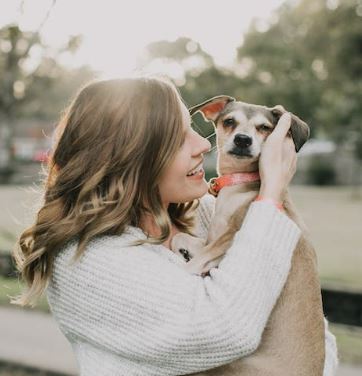
Marissa Delotta, 36, from Dayton, Ohio, is the creative force behind Roverboard.com, a beloved online destination for dog lovers. As a dedicated mom and canine enthusiast, Marissa combines her family experiences with her love for dogs to offer a platform where dog owners can exchange tips, heartwarming stories, and advice. Her website has become a vibrant community for sharing the joys of dog parenting. In her free time, Marissa enjoys exploring dog parks with her family and volunteering at local animal shelters.
